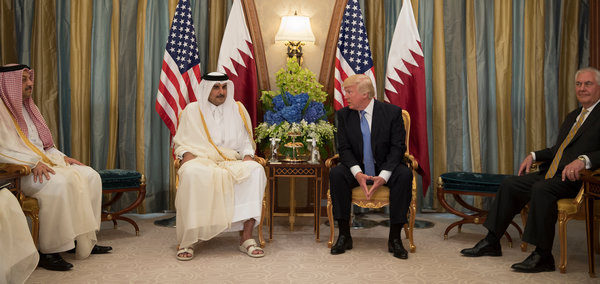Trump supports Saudi-led diplomatic break and blockade of US military ally Qatar
Developments on Day 138 of the Trump Administration:
Trump Charges Into Saudi-Qatar Dispute
Without consulting advisors, Donald Trump charges into a political crisis in the Arab world, following Saudi Arabia’s break with Qatar and imposition of a blockade on Doha.
On Monday, Riyadh and its Gulf allies Bahrain and the UAE suddenly cut diplomatic relations with Qatar. Citing concerns over cyber-warfare and propaganda, the Saudi bloc was soon joined by Libya, Egypt, and the Maldives. Behind the official explanation lay long-standing Saudi animosity towards Qatar’s links with groups such as the Muslim Brotherhood and Palestine’s Hamas.
See Boosted by Trump, Saudi Arabia and Allies Break With Qatar
The split jeopardizes the Trump Administration’s promotion of a regional coalition — an “Arab NATO” — to stand against Iran. Only two weeks ago, Trump was feted by the Saudis and then joined about 50 leaders in a Riyadh Summit to proclaim unity.
The isolation of Qatar — with the expulsion of its diplomats and citizens from Saudi Arabia and the blockade threatening shortages of food and supplies — also raises a question over the status of a US base which is one of the largest in the region, with 11,000 personnel. The emirate also a $60 million center for the US-led coalition’s aerial operations against the Islamic State in Iraq and Syria.
However, Trump was apparently unaware of these concerns when he jumped onto Twitter on Tuesday morning. Instead, the President, who has exploited events — and even made them up — to declare his strong leadership against “terrorism”, applied the approach to the Gulf:
So good to see the Saudi Arabia visit with the King and 50 countries already paying off. They said they would take a hard line on funding…
— Donald J. Trump (@realDonaldTrump) June 6, 2017
…extremism, and all reference was pointing to Qatar. Perhaps this will be the beginning of the end to the horror of terrorism!
— Donald J. Trump (@realDonaldTrump) June 6, 2017
Trump’s Twitter politics undercut the more cautious line of Secretary of State Rex Tillerson and Defense Secretary James Mattis. The President contradicted the US Ambassador to Qatar, Dana Shell Smith, who retweeted her post that Qatar had made “real progress” in curbing financial support for terrorists.
By Tuesday evening — presumably after his advisors were able to engage him — Trump took a different line. In a call with Saudi King Salman, Trump said that unity among Gulf nations was “critical to defeating terrorism and promoting regional stability”, according to the White House.
Administration officials reframed Trump’s tweets, saying the President was not trying to cause a rupture among Arab states. Instead, they said, he was expressing frustration with Qatar’s record and making sure it followed through on commitments to the new joint Terrorist Financing Targeting Center, announced at the Riyadh Summit.
White House spokesman Sean Spicer maintained, “The US still wants to see this issue de-escalated and resolved immediately, keeping with the principles that the President laid out in terms of defeating terror financing.” He said Trump had a “very productive” discussion in Riyadh with Qatar’s Emir Tamim, even though “another person briefed on the conversation” said it was colder than the President’s meetings with other Gulf leaders.
State Department spokeswoman Heather Nauert said the Qataris “have made some great efforts to try to stop financing of terror groups…[but they] still have work to do.”
Qatar’s Ambassador, Meshal bin Hamad al-Thani, said of Trump’s Twitter initiative, ““We were surprised. No one approached us directly and said, ‘Look, we have problems with this and this and this.’”
Thani said Trump had called Qatar “a crucial strategic partner” at the Riyadh Summit: “We had a good meeting with the President and with King Salman — nothing was raised.”
The tension has been compounded by speculation that Russia — as part of its global cyber-operations campaign — carried out the attack that published fake information on Qatar’s state news agency about a speech by Emir Tamim, an incident that fed Saudi anger. A US official said Washington is investigating whether the hackers were state-sponsored.
Meanwhile, there was confusion across Washington about Trump’s intervention. When a reporter showed Senator Bob Corker the President’s tweet, the chairman of the Senate Foreign Relations Committee just shook his head.
TOP PHOTO: Donald Trump with Qatar’s Emir Thani in Riyadh, Saudi Arabia, May 2017 (Stephen Crowley/New York Times)

